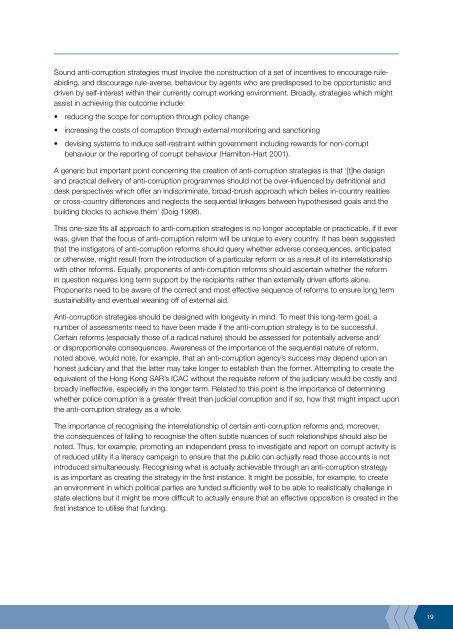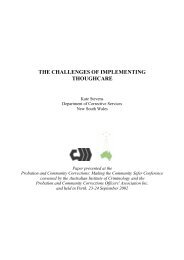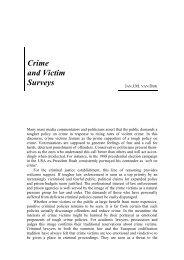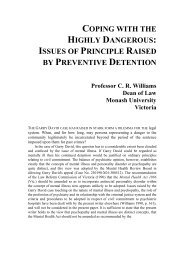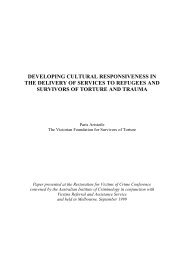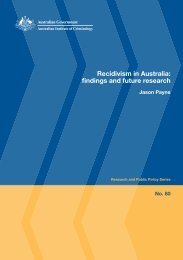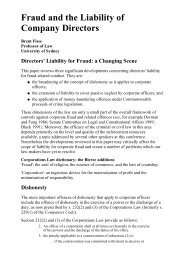Review of anti-corruption strategies Rob McCusker - Australian ...
Review of anti-corruption strategies Rob McCusker - Australian ...
Review of anti-corruption strategies Rob McCusker - Australian ...
You also want an ePaper? Increase the reach of your titles
YUMPU automatically turns print PDFs into web optimized ePapers that Google loves.
Sound <strong>anti</strong>-<strong>corruption</strong> <strong>strategies</strong> must involve the construction <strong>of</strong> a set <strong>of</strong> incentives to encourage ruleabiding,<br />
and discourage rule-averse, behaviour by agents who are predisposed to be opportunistic and<br />
driven by self-interest within their currently corrupt working environment. Broadly, <strong>strategies</strong> which might<br />
assist in achieving this outcome include:<br />
•<br />
•<br />
•<br />
reducing the scope for <strong>corruption</strong> through policy change<br />
increasing the costs <strong>of</strong> <strong>corruption</strong> through external monitoring and sanctioning<br />
devising systems to induce self-restraint within government including rewards for non-corrupt<br />
behaviour or the reporting <strong>of</strong> corrupt behaviour (Hamilton-Hart 2001).<br />
A generic but important point concerning the creation <strong>of</strong> <strong>anti</strong>-<strong>corruption</strong> <strong>strategies</strong> is that ‘[t]he design<br />
and practical delivery <strong>of</strong> <strong>anti</strong>-<strong>corruption</strong> programmes should not be over-influenced by definitional and<br />
desk perspectives which <strong>of</strong>fer an indiscriminate, broad-brush approach which belies in-country realities<br />
or cross-country differences and neglects the sequential linkages between hypothesised goals and the<br />
building blocks to achieve them’ (Doig 1998).<br />
This one-size fits all approach to <strong>anti</strong>-<strong>corruption</strong> <strong>strategies</strong> is no longer acceptable or practicable, if it ever<br />
was, given that the focus <strong>of</strong> <strong>anti</strong>-<strong>corruption</strong> reform will be unique to every country. It has been suggested<br />
that the instigators <strong>of</strong> <strong>anti</strong>-<strong>corruption</strong> reforms should query whether adverse consequences, <strong>anti</strong>cipated<br />
or otherwise, might result from the introduction <strong>of</strong> a particular reform or as a result <strong>of</strong> its interrelationship<br />
with other reforms. Equally, proponents <strong>of</strong> <strong>anti</strong>-<strong>corruption</strong> reforms should ascertain whether the reform<br />
in question requires long term support by the recipients rather than externally driven efforts alone.<br />
Proponents need to be aware <strong>of</strong> the correct and most effective sequence <strong>of</strong> reforms to ensure long term<br />
sustainability and eventual weaning <strong>of</strong>f <strong>of</strong> external aid.<br />
Anti-<strong>corruption</strong> <strong>strategies</strong> should be designed with longevity in mind. To meet this long-term goal, a<br />
number <strong>of</strong> assessments need to have been made if the <strong>anti</strong>-<strong>corruption</strong> strategy is to be successful.<br />
Certain reforms (especially those <strong>of</strong> a radical nature) should be assessed for potentially adverse and/<br />
or disproportionate consequences. Awareness <strong>of</strong> the importance <strong>of</strong> the sequential nature <strong>of</strong> reform,<br />
noted above, would note, for example, that an <strong>anti</strong>-<strong>corruption</strong> agency’s success may depend upon an<br />
honest judiciary and that the latter may take longer to establish than the former. Attempting to create the<br />
equivalent <strong>of</strong> the Hong Kong SAR’s ICAC without the requisite reform <strong>of</strong> the judiciary would be costly and<br />
broadly ineffective, especially in the longer term. Related to this point is the importance <strong>of</strong> determining<br />
whether police <strong>corruption</strong> is a greater threat than judicial <strong>corruption</strong> and if so, how that might impact upon<br />
the <strong>anti</strong>-<strong>corruption</strong> strategy as a whole.<br />
The importance <strong>of</strong> recognising the interrelationship <strong>of</strong> certain <strong>anti</strong>-<strong>corruption</strong> reforms and, moreover,<br />
the consequences <strong>of</strong> failing to recognise the <strong>of</strong>ten subtle nuances <strong>of</strong> such relationships should also be<br />
noted. Thus, for example, promoting an independent press to investigate and report on corrupt activity is<br />
<strong>of</strong> reduced utility if a literacy campaign to ensure that the public can actually read those accounts is not<br />
introduced simultaneously. Recognising what is actually achievable through an <strong>anti</strong>-<strong>corruption</strong> strategy<br />
is as important as creating the strategy in the first instance. It might be possible, for example, to create<br />
an environment in which political parties are funded sufficiently well to be able to realistically challenge in<br />
state elections but it might be more difficult to actually ensure that an effective opposition is created in the<br />
first instance to utilise that funding.


